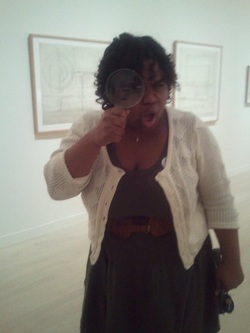Theory of the Courageous Conversation

Today many people call me a visionary for a courageous conversation, because telling people who I am and where I want to go has contributed to my experiences, leadership skills, and need to give back to others through my index of knowledge and networks. Personally, I qualify a courageous conversation as one that allows individuals to look at an issue from different perspectives. When I organize an educational program on campus around a particular issue, I try to incorporate multiple perspectives so that the participants can have a more thorough understanding of the issue.
A courageous conversation should push one’s intellectual capacity. Whether they to accept or reject an issue, I program for students to push themselves out of their intellectual comforts to have the ability to understand opposing arguments and why. A courageous conversation should affirm a student accepting or rejecting their position of an argument for the right reasons. I cannot judge a person for what they believe, and I feel it is important to know why you believe something and how that impacts your values. I want students to be okay with their choices and have internal contentment for why they believe what they believe, or be the agent that challenges them to ask, "what makes you feel different to reject a position you once held?"
After a courageous conversation there is a component that should resonate with us as individuals. This component is the evaluating and reflective portion of any facilitation when constructing meaning with others. A courageous conversation should allow a student to understand why they accept or reject and idea; yet, a student should develop an appreciation for the human dignity of others around an issue. Being able to understand differing beliefs shows compassion and acceptance. I think when we work to accept others, who are different, we learn to appreciate why we are different. It is an intimate moment when groups are able to construct meaning. I thrive for these types of conversations—bringing people together.
After a courageous conversation, I feel one should be provoked to reflect on their social identities and how they impact certain beliefs or values. At the end of a program, I challenge people by asking, “What kind of agent will you be with (blank) information?” I like programming courageous conversations because it fosters a challenge for people to take their talents and do something with the information—to me that is how the world changes.
A courageous conversation should push one’s intellectual capacity. Whether they to accept or reject an issue, I program for students to push themselves out of their intellectual comforts to have the ability to understand opposing arguments and why. A courageous conversation should affirm a student accepting or rejecting their position of an argument for the right reasons. I cannot judge a person for what they believe, and I feel it is important to know why you believe something and how that impacts your values. I want students to be okay with their choices and have internal contentment for why they believe what they believe, or be the agent that challenges them to ask, "what makes you feel different to reject a position you once held?"
After a courageous conversation there is a component that should resonate with us as individuals. This component is the evaluating and reflective portion of any facilitation when constructing meaning with others. A courageous conversation should allow a student to understand why they accept or reject and idea; yet, a student should develop an appreciation for the human dignity of others around an issue. Being able to understand differing beliefs shows compassion and acceptance. I think when we work to accept others, who are different, we learn to appreciate why we are different. It is an intimate moment when groups are able to construct meaning. I thrive for these types of conversations—bringing people together.
After a courageous conversation, I feel one should be provoked to reflect on their social identities and how they impact certain beliefs or values. At the end of a program, I challenge people by asking, “What kind of agent will you be with (blank) information?” I like programming courageous conversations because it fosters a challenge for people to take their talents and do something with the information—to me that is how the world changes.
